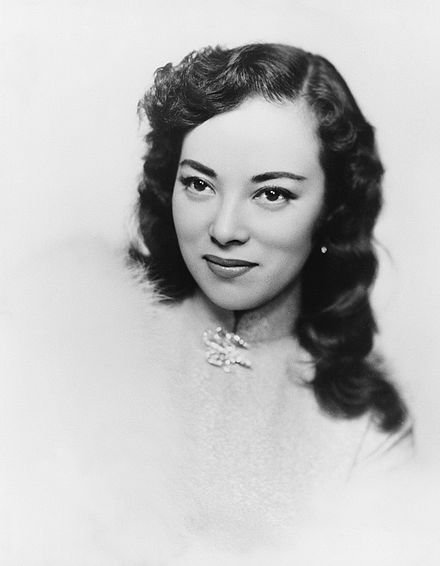Li Xianglan
李香蘭
1920–2014
“Japan’s Judy Garland”
By Annie Y. Liu
Li Xianglan, better known as Yoshiko Yamaguchi, was born in 1920 in Manchuria, China. Her parents moved there after the First Sino-Japanese War, which allowed Japanese occupation in Manchuria. Yoshiko’s family had strong ties to General Li Jichun and politician Pan Yugui; they became “godfather” figures who gave Yoshiko the Chinese names “Li Xianglan” and “Pan Shuhua” (Moreno, 2017). Her connections to China became essential to her identity–Yoshiko often referred to Japan as her fatherland and China as her motherland. Her parents also encouraged her to pursue her education, including opera lessons from an Italian soprano, Madame Podlesov, to help her recover from a bout of tuberculosis in her youth. She later attended school in Beijing (Luke, 2016).
When Yoshiko was eighteen, she was recruited by the Manchurian Motion Picture Company, Man’ei, a Japanese propaganda film company. Against her will, her parents signed her contract, and she became an actress and singer under the name Li Xianglan, starring in seventeen Man’ei films between 1938 and 1945. She had very little control over this stage of her career. Through Yoshiko’s roles, Man’ei promoted the Greater East Asia Co-Prosperity Sphere messaging from Japan during this time (Stephenson, 2002). Her films inevitably drew backlash from Chinese audiences—notably, her characters were often young Chinese women whose initial hostility toward Japanese men turns into affection, a metaphor for Chinese resistance-turned-submission to Japanese domination.
After the war, Li Xianglan effectively ceased to exist, as the new Chinese government banned Yoshiko from the country for her propagandistic role during the war. Yoshiko returned to Japan and continued her performance career there, as well as in Hong Kong and Hollywood, as “Shirley Yamaguchi.” She married sculptor Isamu Noguchi in 1951, whom she subsequently divorced in 1956. She was married again in 1958 to diplomat Hiroshi Otaka and spent time traveling the world with him. Yoshiko’s film experience led her to host various TV programs, which in turn inspired her to become involved in politics and advocacy. She was elected to the Japanese House of Councilors in 1974 and served for multiple terms, eventually retiring in 1992 (Luke, 2016).
Yoshiko Yamaguchi is well known for her political career, especially her antiwar stance, her interviews with world leaders, and her international acting and singing career. She was also one of the first Japanese public figures to openly critique and apologize for Japanese colonialism in China and to advocate for compensation for “comfort women” during World War II. Beyond her political and journalistic careers, she led a life of many names and identities, including that of Li Xianglan, the famous actress and one of the Seven Great Singing Stars.
Luke, Alison. “Resilience, Agency, and Activism: Viewing Yoshiko Yamaguchi through the Feminist Life Course Perspective.” Women’s Studies International Forum 57 (2016): 11–21.
Moreno, Edward. “Orchid from the North–Part 1.” Discover Nikkei, January 23, 2017. https://discovernikkei.org/en/journal/2017/1/23/orchid-from-the-north-1/
Stephenson, Shelley. “A Star by Any Other Name: The (After) Lives of Li Xianglan.” Quarterly Review of Film & Video 19 (2002): 1–13.
A note from the author:
I recently had the wonderful opportunity to write a guest blog on the Women’s Song Forum, a website “devoted to women’s song and voices.” My post, titled “China Nights: Li Xianglan and Japanese Propaganda Film” discusses the life and career of Li Xianglan, or Yoshiko Yamaguchi, during World War II in Shanghai. To read the post, click here. To listen to her songs, click here.





